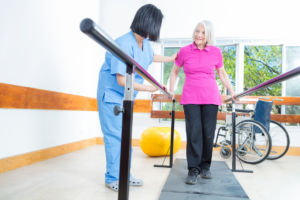Living well with Parkinson’s means living well in all aspects of your life—physical, mental, social, spiritual. One provider can’t possibly treat every part of your life, so, ideally, over time, you will build a holistic, integrated care team and plan that is personalized to YOUR symptoms, needs, and goals.
In the beginning, your primary care physician and neurologist or movement disorder specialist may be the only two people you need on your care team. However, your team may grow to include anywhere from three to ten or more providers over the years. Everyone is different, and not everyone will need the same types and number of providers. To give you an idea of the many professionals who can help you live well with Parkinson’s every day, here are some to consider.
Neurologists and Movement Disorder Specialists
A neurologist is a medical doctor specializing in the nervous system's conditions (the brain and the spinal cord). They can confirm a Parkinson's diagnosis and establish an appropriate treatment plan.
A movement disorder specialist (MDS) is a neurologist with additional training in movement disorders. Your MDS will most likely be the person on your medical care team who is most familiar with the full spectrum of Parkinson’s medications and treatments. They see thousands of people with Parkinson’s every year; so, they have probably helped people with issues similar to yours before.
Finding an MDS close to you isn’t always possible, but having one on your medical care team can be the difference between living well with Parkinson’s and just getting by. Because you may only need to see your MDS in person once or twice a year, driving a few hours to these appointments is likely to be time well spent. And with current advances in technology, you may be able to add an MDS to your care team through telemedicine, which is becoming more mainstream every day.
 If you don’t have a movement disorder specialist close to home, and you aren’t able to see one via telemedicine, seek out an empathetic neurologist or primary care doctor who will listen to you and your family, work with you to define your needs and goals, and be open to your suggestions and ideas. If your local care team doesn’t include a movement disorder specialist, but you can travel occasionally to see one in another city, your movement disorder specialist and local physician can work together to address your needs.
If you don’t have a movement disorder specialist close to home, and you aren’t able to see one via telemedicine, seek out an empathetic neurologist or primary care doctor who will listen to you and your family, work with you to define your needs and goals, and be open to your suggestions and ideas. If your local care team doesn’t include a movement disorder specialist, but you can travel occasionally to see one in another city, your movement disorder specialist and local physician can work together to address your needs.
Primary Care Physicians
Your primary care physician (PCP) will play an essential role in problems unrelated to Parkinson’s, monitor your general health, and make sure you stay up-to-date on preventive medical screening tests. This physician also provides general health education and will work with you to diagnose and treat your general medical problems and ensure that you receive routine dental and vision care. Managing your healthcare without a PCP is like an orchestra playing without a conductor. Your PCP may help identify potential medication interactions and assist you in finding additional specialists if needed.
Avoid waiting until you have a problem or are sick before you see your PCP. Schedule a yearly examination to focus on your current medical issues, detect new problems, and prevent future problems. Keep your PCP updated on any changes in your Parkinson’s symptoms and treatment, as this may influence how other problems are treated and help you avoid medication interactions.
Nurses
Nurses are important and often underutilized care team members and can be strong liaisons between hospitals, medical offices, and the community. Nurses are often the first line of access, and if your question or concern is a problem they cannot solve, they know who on the team can.
Neuropsychologist
Neuropsychologists specialize in the relationship between behavior and brain function. Cognitive impairment and behavioral complications such as depression, anxiety, and apathy can be some of the earliest symptoms people with Parkinson’s notice, often before they even get an official diagnosis. Most people with Parkinson’s will experience these issues at some point. If you do, a great first step to treatment is to get evaluated by a neuropsychologist who specializes in neurological disorders. They can assess your thinking skills, including memory, attention, reaction time, language, and visual perception. They will also assess your emotional functioning. Your results will then be combined with the rest of your medical record to help your neuropsychologist develop a diagnosis and recommendations for improving your quality of life. One of the benefits of getting an evaluation like this early on is that you will see how your Parkinson’s is progressing over time and act as soon as possible to manage your symptoms.
Psychologist, Social Worker, or Counselor
Professionals who focus on emotional health and well-being will be helpful throughout your Parkinson’s journey. Counselors, social workers, and psychologists are trained to assess emotional difficulties and work with you and your doctor to promote good mental health. They can help you cope and stay positive. They can also help you manage stress that can make Parkinson’s symptoms worse, causing additional strain on you and your family. They can serve as guides for both you and your family, helping you to respond with resilience to changes you hadn’t anticipated.
Psychiatrist
Psychiatrists are medical doctors who specialize in mental health. They are qualified to assess both the psychological and physical aspects of psychological problems and prescribe medication. If you experience emotional symptoms such as anxiety, depression, or apathy, a psychiatrist can work with you to adjust your medication regimen in ways that can help.
Spiritual Advisor/Chaplain
If faith is part of your life, a pastor, chaplain, rabbi, or other spiritual advisors can help you find peace, discover meaning, and accept life changes within the comfort and context of your beliefs. Whether within the construct of traditional religions or through other forms of spiritual expression, many people rely on these advisors to provide the support and hope they need to embrace the future.
Physical Therapist
Physical therapy can help you improve strength, flexibility, and mobility, and it can also decrease stiffness and pain related to Parkinson’s. Many people with Parkinson’s don’t realize how valuable a physical therapist (PT) can be to their care team in the early days; however, the people we know who have worked with them consistently have received tremendous value from doing so – both physically and emotionally.
 When you begin seeing a PT early after your diagnosis, they can teach exercises that address any current weaknesses, which will allow you to stay stronger and mobile for longer. You may ride your bike every day or still run multiple marathons a year; however, there’s a good chance you still have some gaps in your flexibility or mobility that physical therapy could close. Also, by getting an assessment early, your PT will be able to see how your Parkinson’s is progressing over time so they can give you exercises to address areas that may be getting weaker.
When you begin seeing a PT early after your diagnosis, they can teach exercises that address any current weaknesses, which will allow you to stay stronger and mobile for longer. You may ride your bike every day or still run multiple marathons a year; however, there’s a good chance you still have some gaps in your flexibility or mobility that physical therapy could close. Also, by getting an assessment early, your PT will be able to see how your Parkinson’s is progressing over time so they can give you exercises to address areas that may be getting weaker.
Occupational Therapist
Occupational therapy (OT) is the only profession that helps people across the lifespan do things they want to do through therapeutic activities (occupations). Occupational therapists enable people of all ages to live life to its fullest by helping them promote health and prevent or live better with injury, illness, or disability.
OT interventions focus on adapting the environment through modifications, modifying the task, teaching a skill, and educating the person, care partner, and family to increase participation and ability to perform daily activities. OT is practical and customizable, focusing primarily on activities that are important and meaningful to you.
Speech-Language Pathologist
As Parkinson’s progresses, some people find it difficult to speak loudly, pronounce words clearly, speak fluidly, and show facial expression. However, it is possible to improve all these symptoms by working with a speech therapist or speech-language pathologist. These rehabilitative professionals can also help you with eating, swallowing issues, saliva management, dry mouth, drool, and more.
Pharmacist
Most likely, you and your care partners will see a pharmacist regularly. And, because they will know all the medications you take — those that are related to Parkinson’s and those that aren’t — they will be on the lookout for medication interactions that your primary doctor may not always be aware of. Whenever you’re prescribed a new medicine, be sure to ask your pharmacist if there’s anything you need to know about how it might interact with other meds you’re taking. Pharmacists can also advise about crushing pills, splitting doses, easy-open bottles, and more.
 Registered Dietician
Registered Dietician
When it comes to nutritional plans, what works for you may not work for someone else. And for every article (peer-reviewed or otherwise) on why diet X is the best, there is another one that claims Y is better. To find the best nutritional strategy for you, see a registered dietician (RD) specializing in working with people with Parkinson’s or other neurological disorders. RDs are usually the most qualified health professionals on nutrition and dietetics, unless your primary care doctor, neurologist, or movement disorder specialist specializes in that field.
dentist
Regular dental exams are an important part of preventive care for everyone, and for a person with Parkinson’s, good dental care is even more critical. That’s because Parkinson’s can impact the mouth and jaw and make dental care more challenging. Regular dental exams and cleanings are important to ensure you have healthy teeth and gums. At these appointments, often scheduled every six months, your dentist can check for cavities, plaque, tartar, and gum disease and ensure that you are properly caring for your oral health.
dermatologist
Melanoma, one type of skin cancer, has been consistently linked to Parkinson’s. Because melanoma is treatable if caught early but can be dangerous if not detected until the later stages, it’s crucial that people with Parkinson’s focus on skin protection and regular skin cancer screenings. During these screenings, a dermatologist will check your skin for moles, birthmarks, or other marks that are unusual in color, size, shape, or texture. If skin cancer is suspected after a screening, your physician will perform a biopsy to remove cells from the suspicious mark on your skin. A pathologist will then study the cells or tissue under a microscope to check for damage or disease.
eye care professional
Regular eye exams with an eye care professional should be part of your preventative care routine. These exams are essential for screening for eye diseases and preserving your vision. There are several different types of eye physicians: ophthalmologists, medical physicians who have completed four years of medical school followed by four years of residency training in ophthalmology; optometrists, healthcare providers who complete physician training in optometry but who have not attended medical school; and neuro-ophthalmologists, who are neurologists or ophthalmologists with expertise in visual symptoms from neurologic disease.

Family and Friends
Your family members are also living with Parkinson’s and will be key partners throughout your journey. They can work with you to assemble your care team and be the record keeper of therapies and outcomes. Look to your friends and community as sources of healthy social connectivity and for support.
YOU
Then, of course, there’s you.
YOU are the most critical member of the team. Think about the role you want to play as the primary team member. Be an active participant in managing your condition. Being engaged and empowered in your care gets results.
You, your care partner, and your family need a support system that will be in place for the duration of your journey with Parkinson’s; so, do not wait to reach out and start adopting a holistic approach. Create a team of providers who can offer expertise in many different areas. Be an advocate for yourself as you build a team of providers who listen, respect your input, and with whom you feel comfortable. Being a strong self-advocate will give you a strong foundation and help you to live well with Parkinson’s today and for many years to come.
Want more articles like this?
Much more can be found in our Every Victory Counts® manual. It’s packed with up-to-date information about everything Parkinson’s, plus an expanded worksheets and resources section to help you put what you’ve learned into action. Request your free copy of the Every Victory Counts manual by clicking the button below.
Thank you to our 2021 Peak Partners, Adamas, Amneal, Kyowa Kirin, and Sunovion, for helping us make printing, distribution, and shipping of the Every Victory Counts manual possible.



















